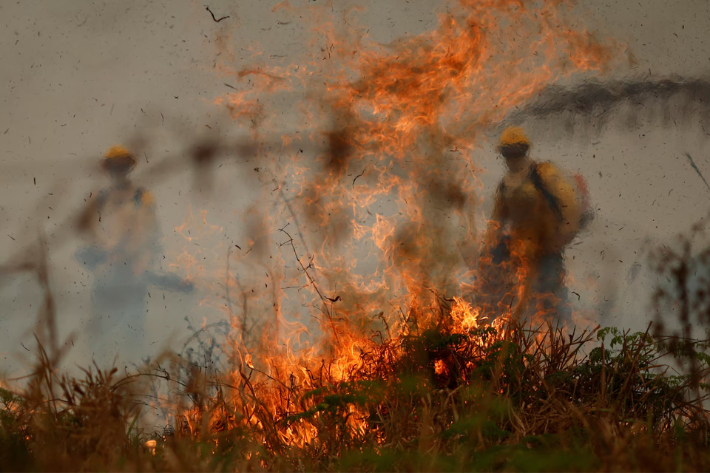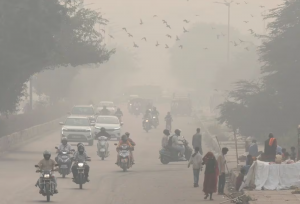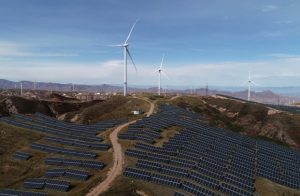Despite unprecedented heat and an increasing number of extreme weather events, the world is set to make zero progress on cutting emissions – yet again, a new report has indicated.
Scientists say global greenhouse gas emissions are on track to hit another record high this year, thanks to continuing use of fossil fuels for energy.
Emissions are set to total 41.6 billion metric tons in 2024, up from 40.6 billion tons last year, they said in The Global Carbon Budget report, published on Wednesday during the United Nations’ COP29 climate summit in Azerbaijan.
Also on AF: COP29 Takes a Step Towards UN-Backed Global Carbon Market
This will be the second consecutive year of record high emissions from the world even as warming temperatures fuel unprecedented storms, floods and droughts across the planet.
In a report last month the United Nations said the world would break past the 1.5 degrees Celsius warming threshold if emissions continue to grow unabated. It would also mean the world could warm to a ‘catastrophic’ 3.1 degrees by the end of the century.
Scientists have repeatedly said that the key to meeting climate goals is an energy transition away from fossil fuels. The International Energy Agency says all new oil and gas exploration and expansion needs to stop immediately to limit global warming.
But, instead, fossil fuel emissions have climbed over the last decade.
‘No end in sight to fossil fuel use’
The bulk of this year’s emissions are from burning coal, oil and gas. Those emissions would total 37.4 billion tons in 2024, up by 0.8% in 2023, the report said.
“We don’t see a sign of fossil fuel emissions peaking in 2024,” said lead author Pierre Friedlingstein, a climate scientist at the University of Exeter.
Without immediate and steep emissions cuts worldwide, “we will just go straight into the 1.5C target, we’ll just pass it and continue,” he said.
Emissions from international aviation and shipping are also expected to jump by 7.8% this year
The rest of emissions for the year, meanwhile, are from land use, a category that includes deforestation and forest fires.
Land use emissions had declined over the past decade – until this year, when a severe drought in the Amazon caused forest fires, driving up annual land use emissions by 13.5% to 4.2 billion tons.
The dire situation posed by rising emissions is evidenced by the fact that in 2019, the UN warned the world needed to cut emissions by 7.6% over the decade starting 2020 to meet the 1.5°C target.
The only year that emissions dropped, since that report, was in 2020 after the Covid-19 pandemic brought the world to a standstill.
Emissions from 2021 started back on an upwards trajectory, crossing pre-pandemic levels in 2023 — when they hit a record high.
View this post on Instagram
Asian emissions on the rise
Some scientists have said such slow progress means the 1.5C aim can no longer realistically be met.
Still, the carbon budget report did indicate some progress, as the data showed that some countries had rapidly expanded renewable energy and electric cars.
That expansion was sharply uneven, however. Data showed that while rich industrialised nations cut emissions, emerging economies were still releasing an increasing amount of planet warming gases.
India’s emissions are set to rise by 4.6% for the year, driven by soaring power demand fuelled by economic growth.
Emissions in China, today the world’s biggest emitter and second-largest oil consumer, are also set to marginally increase by 0.2%. The report’s authors said China’s emissions from oil use have likely peaked, as electric vehicles gain market share.
Meanwhile, emissions in the US, the world’s top oil and gas producer and consumer, are expected to decrease by 0.6% this year, while European Union emissions are set to fall by 3.8%.
Whether the US continues to maintain that reduction in emissions will depend on policies implemented by newly-elected president Donald Trump.
Trump believes climate change is a hoax and has promised to reverse dozens of environmental rules and policies deemed as harsh by oil and gas drillers.
- Reuters, with additional editing and inputs from Vishakha Saxena
Also read:
‘We Are on a Road to Ruin’: COP29 Kicks Off Amid Trump Worry
Uncertainty on Methane Emission Fee as Biden Term Nears End
Scientists Say 2024 ‘Virtually Certain’ to be Hottest on Record
Floods or Drought: Climate Change Worsens Global Water Woes
Asian Economies at Risk From Inaction on Climate Change: ADB
Climate Change Has Cost China $32 Billion in Just One Quarter
Emissions of World’s Super Rich ‘Drive Economic Losses, Deaths’
Energy Emissions Set to Peak But ‘Not in Time’ For Climate Goals
BP Dumps Oil Pledge While Chasing Billions in Climate Subsidies
Scientists Fear Nature’s Carbon Sinks Are Failing – Guardian
Could Melting Glaciers Trigger Volcanic Eruptions? – Reuters
























